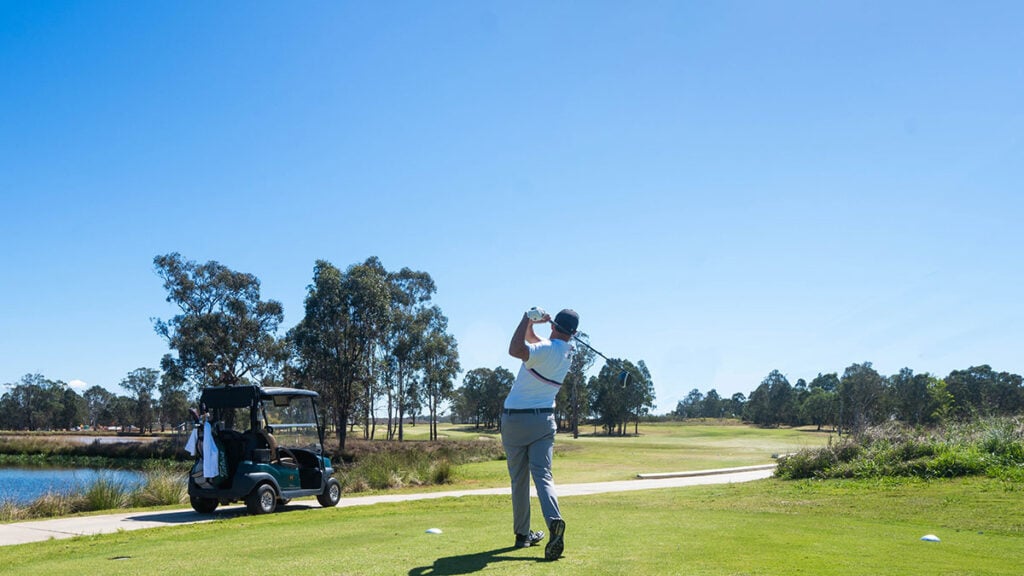Thinking back, Khan Pullen can identify a few indicators that suggested this week was going to be Cam Davis’s week.
There was the window of time that allowed sports psychologist Neale Smith to spend two days with Davis at his home in Seattle working on how to remain calm under pressure.
There was a significant adjustment in the Titleist van to the face angle of his driver from 8.25 degrees to 9.5 degrees that would allow him to stay on top of the ball and confident through the downswing… and subsequently hit more fairways.
Then there was Kramer Hickok’s near miss a week earlier in an eight-hole playoff with Harris English at the Travelers Championship, the pair becoming good friends whilst playing the Canadian and Korn Ferry Tour together a few years ago.
And then there was Davis’s lust for revenge.
Having missed the cut in his two previous starts at Detroit Golf Club, Davis sent his coach back in Sydney a text message that was laced with fierce determination: ‘I’m going to get that course this week.’
A 26-year-old who spent his junior days at Kareela Golf Club in Sydney’s south – the same stomping ground of a young Matt Jones – Davis did on Sunday in America what many had been expecting since he won the 2017 Australian Open over Jason Day and Jordan Spieth.
Davis’s breakthrough PGA TOUR title came in dramatic fashion at the Rocket Mortgage Classic in Detroit, firstly playing his way into a three-man playoff with some late-hole heroics and then overcoming four near misses to secure the win on the fifth playoff hole.
The shot-making was breath-taking; the putts that skated by time after time heart-wrenching.
Yet behind it all Davis put into practice the mental training he and Smith had been honing for two years until victory was his.
“That’s the most composed under pressure I’ve ever seen him,” said Pullen, who became Davis’s coach when he was 16 shortly after inviting him to a Golf Australia talent identification camp in Melbourne during his time as National Coach.
“His body language, not over-reacting to shots, the rhythm of his walk and his patience through that playoff was the best I’ve ever seen.
“That was the final little hurdle for him to win, having that composure when it really, really mattered.
“You don’t hit it that well if you’re not that composed and mentally you’re not in the right spot, especially in those situations.
“It was pretty amazing to watch.”
Following the Memorial Tournament in early June, Davis didn’t touch a club for two weeks before picking them back up again a week ago and inviting Smith to spend the weekend working on his mental approach.
Smith is a proponent of establishing routines for players to come into a shot and then a routine to leave it and Davis admitted that he leaned on that as the tournament reached its crescendo.
“We did a lot of work on just routine, and that sort of stuff is really what you fall back on,” said Davis, whose previous best finish on the PGA TOUR came with a third-place finish at The American Express in January and is projected to rise from 134 to No.67 in the Official World Golf Rankings.
“I don’t really have any experiences in the past that kind of prepared me for it. Australian Open back years ago now was similar in that I didn’t really know where I stood when I was coming down the last couple of holes and I was able to hit some good ones and get across the line.
“I wasn’t thinking about that, though. I was just thinking about all the things that I had done all this week leading up to that point and just tried to keep it going.
“It was just putting all that stuff on repeat.
“There’s definitely room for nerves to set in if you do start kind of letting your mind wander, but I felt like I was really deliberate and did a good job of that. That kept me going all the way through each hole of the playoff and at the end of regulation as well.”
Recognising that his charge had got off to a nervy start, Pullen thought first that a bogey at the par-3 ninth might stall his progress and then a three-putt bogey from 36 feet at the par-4 16th might have ended it for good.
But his brilliant bunker shot and exquisite execution on the 72nd hole brought to the world’s attention what Pullen first saw a decade ago.
“He always had this x-factor about him,” Pullen added.
“I caddied for him in a match at the Interstate Series and being inside the ropes with him you could really tell his passion for the sport. He just really loved to play, loved to compete.
“And he just had this little x-factor about him that I thought really separated him.”
As for how this will change Davis’s life, his coach has one simple request.
“Hopefully he’ll get Cam Davis more than Cam Smith now because they still get that wrong half the time,” Pullen said.
“Hopefully he’s formed his own identity now.”




